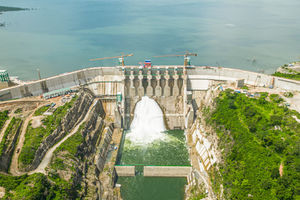Call for protection of resources

Participants from local and international civil society organisations hold a meeting in Dar es Salaam recently to discuss the protection of natural resources in the new Constitution. PHOTO | SYLIVESTER ERNEST
What you need to know:
- “Inserting provisions that give citizens the right to enjoy natural resources will be in line with the Draft Constitution’s Preamble,” Mr Mustafa said.
Dar es Salaam. Since there is staggering wealth in natural resources, the new Constitution should have provisions that recognise the right of Tanzanians to benefit from their natural resources.
Participants at a meeting held to discuss and comment on the Draft Constitution asked the Constitutional Review Commission (CRC) to lay much emphasis on ownership, protection and control, benefit sharing and transparency in accessing natural resources so that it doesn’t become a curse to Tanzanians, as it has happened in other countries.
The meeting, organised by HakiRaslimali, a network of local and international civil society organisations working to promote extractive resource justice, discussed how the Draft Constitution could be improved with a view to protecting extractive (oil, gas and minerals) resource governance.
The network, which has members from Agenda Participation 2000, Policy Forum, Oil and Gas Coalition-Ongea, FoundationHelp, IANRA Tanzania Chapter, Lawyers Environmental Action Team (LEAT) and Interfaith Committee on Economic Justice and Integrity of Creation and the Centre for Environment and Governance, asked the CRC to ensure there was a shift in the responsibility of protecting the environment from the government to citizens.
Since oil, gas and mineral resources are not stipulated as Union matters, participants argued that the new Constitution should have clear provisions that protected natural resources and the environment in each partner state’s respective constitutions.
HakiRaslimali director Amani Mustafa asked the CRC and the Constituent Assembly in their wisdom to include in the Bill of Rights, the right of citizens to benefit from their natural resources in line with Article 12(e), Article 51(3) and Article 52(1)(b) of the Draft Constitution all of which call for respect of regional and international treaties such as the African Charter of Human and People’s Rights that calls for a right on benefiting from natural resources by citizens under Article 21.
“Inserting provisions that give citizens the right to enjoy natural resources will be in line with the Draft Constitution’s Preamble,” Mr Mustafa said.
The meeting also asked the CRC to insert a provision that gives the right to benefit from natural resources by citizens and acquire any measures that will affect that right to involve all citizens and Members of Parliament.
“We are of the view that this right be recognised and provided for under the Bill of Rights as it is recognised and provided for in the Banjul Charter,” said LEAT director Rugemeleza Nshala.
Mr Rugemeleza added: “Although one can argue that if it is provided for in the Banjul Charter, then it is part of this Constitution through Article 51(3), following a series of events that have happened in our country regarding dubious mineral contracts and violence caused by mineral and gas concessions, we still insist that this right should be provided for in the Constitution.”
Peter Bofin, a representative from Oxfam insisted that there should be a clause that stated that the Constitution was above those of Tanganyika and Zanzibar.
This, according to him, will help members of the public to be aware of all provisions that have been provided for in the Draft Constitution, as a result of wider public involvement which may not be enjoyed in developing the state parties’ respective constitutions.
“The Union Constitution is intended to be the fundamental law not only on Union matters, but also on people’s rights and obligations. So, without making it stand above the two state Constitutions defeats its own purpose and is most likely to be subjected to other laws,” he said.
Participants said claw back clauses and articles that subjected the provisions of this Constitution to Parliamentary laws and regulations should be eliminated to make the supreme law what it is supposed to be.
“The Constitution is the supreme law of the country and subjecting it to other laws enacted in the Parliament is against the wishes of the people and is defeating its supremacy.”
“We appeal to the CRC and the Constituent Assembly not to repeat the mistakes of African nations’ independence Constitutions and those that followed in the 1970s and the 1980s because they had numerous claw back clauses that were later misused to trample on basic human rights.”




